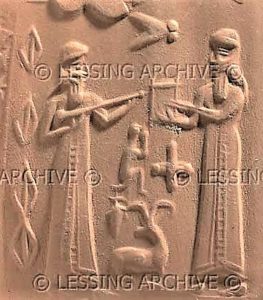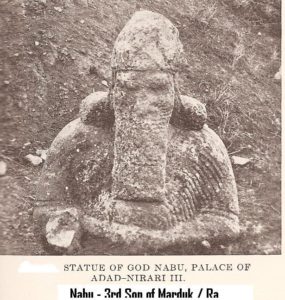(Texts: All Artifacts, Color Coding, & Writings in Bold Type With Italics Inside Parenthesis, are Added by Editor R. Brown, not the Authors, Translators, or Publishers!)
(gods in blue …mixed-breed demigods in teal…)
For the god Marduk, great lord, heroic, eminent, exalted, lord of everything, lord of lords,
august judge who makes decisions for (all) the inhabited world, lord of (all) lands,
lord of Babylon, the one who dwells in Esagila, his lord:
Marduk-zākir-šumi, king of the world, prince who reveres him,
in order to ensure his good health (and) the well-being of his descendant(s),
to prolong his days, to confirm his reign, to defeat his enemy, and to live in safety in his (the god Marduk’s) presence forever,
had made and presented (to Marduk this) seal of shining lapis lazuli,
which is duly (and) carefully manufactured with red gold, (as an item) fitting for his holy neck.
2nd Inscription:
[…] their […] … […] [… Babylon] and Borsippa […] [… ki]ng of Babylon … […]
[…] within the heavens the writing board (recording) the exemption of Babylon […]
[… they sp]eak with him; they anoint his head with oil … […]
[… while] they watched, he desc[ended] to the earth … […]
[…] the prince commissioned auxiliary troops (to protect) the exemption of Babylon and Borsippa […]
[…] he had (it) inscribed [upon a canopy] of ṣāriru-gold and [set (it) up] in the ‟Gate-of-Well-being,”
the cella of the god Bēl […] […] in the disorder and trouble […]
[…] Babylon, the freedom and privileged status of Babylon […]
[… he] established. He inscribed (it) upon the gold canopy of the god Bēl and for the fut[ure …]
[…] and in the accession year of Marduk-zākir-šumi, k[ing of Babylon …]
[… ki]ng of the world, prince who reveres their great divinity, […] the exemption of Babylon […]
[… on account of the rebellion] and unrest in the land of Akkad were [forgotten …]
[… the exemption of Bo]rsippa was not established; to change … afterwards […]
 (Marduk & son Nabu the scribe)
(Marduk & son Nabu the scribe)
[the god Nabû …], the judge who makes opposing sides agree, in the month of Nisan, on the eleventh day, the gate […]
[…] the goddess Zarpanītu entered and for the kingship of Marduk-zākir-šumi, ki[ng …]
[…] thus he asked but no one answered him. In the sixteenth year […]
[…] ... to complete, the omens […] […] … because of the exe[mption …]
[…] … because of the fre[edom …] […] … […]
[…] … […] […] regular offerings, the oil presser of the regular offerings, […]
[…] the fullers, those who do the work of the temple […]
[…] he released them [from feudal obligations and corvée]-labour of every kind and […]
[… he] released them. The runaway, the fugitive […]
[who … whe]ther from the land of Aramu or from the city of […]
[… fl]ed, a provinical governor, a [chief administrator (of a temple), a governor, a royal official …]
[… an] official, a provincial governor, a chief administrator (of a temple), a governor, a royal [official], and a […]
[…] the citizen[s …] is not to enter […] […] … is not to anoint, not to release, to an[other] place […]
[…] he entrusted to the citizens of Borsippa; … tax of the citizen[s …]
[…] ... […] […] … […] […] … […] […] a mayor, a herald […] […] he entrusted to him; his property […]
[…] a provincial governor, a chief administrator (of a temple), a governor, a [royal official …]
[…] he imposes […] for Borsippa. In one kurru, one sūtu of field […] […] my lord wrote … […]
[… he puri]fied. If a provincial governor, a chief administrator (of a temple), a governor, a royal official […]
[…] Borsippa … unknowingly a sin to him against […] […] … and of my house, my lord … […]
[… the citi]zens of Borsippa whom Marduk-zākir-šumi, the king of Babylon, at the command of the god Nabû, [his] lord […]
[…] he purified […] … of the god Nabû for the god Nabû, his lord, (and) in Borsippa, the city … […]
[Anyone who …] removes this […] and […] the foundation of the people of Borsippa […]
[…] whether prince, or viceroy, or overseer, or [lieutenant …]
[…] the servants of the god Nabû, my lord, … […] […] … […] […] … […]
Reverse:
[…] … […]
3rd Inscription:
(Property) of Abdi-il, šaknu-official of Adinu, the Dakkurian.
